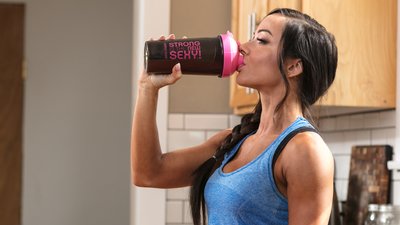Thanks in large part to the misinformed media and lousy reporting, many women still believe creatine is a "guys only" supplement. To make matters worse, supplement companies routinely leave creatine out of their women's supplements, further reinforcing the gender divide.
As a fit-minded woman and scientist, I get annoyed with the anti-creatine absurdity. Creatine is one of the most researched supplements out there. Studies have shown time and time again that creatine can enhance strength, increase lean body mass, and improve exercise performance—regardless of sex. I'd argue it has something to offer nearly everybody.
Yet even with hundreds of published studies lauding it's praises, many women who train regularly don't take creatine. I've recommended the supplement more times than I can count, but I always hear the same excuses. These are the three most common, as well as my responses.
1. "It'll make me bulk up"
I hear it all the time: Creatine is a supplement you only take when you've got a first-class ticket on the gain train. Sure, you may notice a small weight change with initial use, but there's no reason to believe it'll cause you to instantaneously resemble the Hulk.
Adding serious, long-lasting mass comes from eating a lot and lifting heavy weights religiously. Talk to anyone who's followed a bulking program, and they'll tell you adding muscle takes a lot more work than just supplementing with creatine.

Let's face it ladies: We have significantly lower levels of testosterone, the hormone most responsible for muscle growth, than men do, making it extremely difficult to put on a large amount of muscle mass.
So let's put this one to rest. Creatine alone will not cause you to bulk up. But it might help you have better workouts overall, which will help just about any goal.
2. "It'll make me feel bloated"
There's a huge fear that creatine will cause you retain water, feel bloated, and have GI distress. It's bad enough that we have to deal with bloating and cramps during certain times of the month, so why makes things worse with a supplement?
Believe it or not, research shows that men using creatine tend to experience more water retention and weight gain than women.[1,2] Women may experience some water retention, but only during a loading protocol of 20 grams of creatine per day for 5-7 days, and even this diminishes over time.
Luckily, you don't need to load creatine in order for it to work! Any advantage of loading over a single daily dose is negligible in the long term. As long as you stick consistently to a low-dose protocol (3-5 grams daily), it's highly unlikely you'll see any change in your weight or any unpleasant side effects.
3. "It's not safe"
First and foremost, I want to point out that creatine is in no way, shape, or form an anabolic steroid. It boasts more data on safety and effectiveness than popular women's supplements like CLA, carnitine, and glutamine. It's not considered a banned substance by any sport-governing body, either, so it won't make you fail a test if you compete at your sport.

Some people believe that creatine can cause kidney damage or even liver failure. I'll spare you the nitty-gritty research studies, but I want to put your mind at ease: In the hundreds of studies done on the safety of creatine, none have ever shown it poses any type of health risk.
Not only is it considered safe to take, your own body actually produces it! Moreover, you probably consume it in your diet without even knowing it. Eat meat or fish? Then you're consuming creatine.
Trust me. A properly dosed creatine supplement is perfectly safe for women.
What Creatine Can Do for You!
Although the majority of research has been conducted on men, there's strong evidence that women can increase strength without gaining weight when supplementing with creatine.[3-5]
Here's how it works: In order for a muscle to contract, the cellular fuel molecule adenosine triphosphate (ATP) must break off a phosphate group, leaving behind adenosine diphosphate (ADP). Your body can't use ADP. Luckily, the ADP borrows a phosphate molecule from your body's store of creatine phosphate (PCr) to form more ATP.
Supplementing with creatine allows for more creatine phosphate to be available to replenish ATP stores. When your body can replenish energy more easily like this, you can train at higher intensities and with higher volume without fatiguing as quickly.

Studies have shown that both untrained and resistance-trained women can significantly increase both upper-body and lower-body strength when supplementing with creatine. Additionally, a 2003 review study found that women have greater relative improvements in strength compared with men: 14.8 percent versus 5.5 percent.[1]
Creatine has also been shown to benefit athletes outside of the weight room. It improved sprint and agility performance in elite soccer athletes preparing for the Olympics and decreased recovery time for cyclists. [6-8] That's part of why creatine was my surprising top choice for the supplements endurance athlete should take.
Regardless of your goals—improving strength and power, increasing muscle mass, decreasing body fat, or just getting better at the physical activities you love—the ability to train harder and with more energy will help you achieve them.
What Type and How Much to Take
Creatine monohydrate is the most researched and supported type of creatine available on the market. Although there are other forms of creatine such as creatine ethyl ester, creatine HCL, or creatine nitrate, no research thus far suggests that any of these forms have any benefit over creatine monohydrate. [9]

I recommend taking 3-5 grams of creatine per day. As I mentioned before, there's really no reason to load creatine. Stick with a lower dose for about a month, and you'll still maximize stores. There's also no need to cycle off creatine. I've been taking creatine every single day for the last five years.
Crea-Win!
Creatine is one of the most inexpensive sports supplements on the market, so you get a lot of bang for your buck. It is also tasteless and mixes well, so you can add it to pretty much any drink or protein shake without ruining the flavor.
Have I convinced you yet? If not, let me know! If you have more questions about creatine, dosing, or when or why to take it, hit me up in the comments section below.
References
- Branch, J. D. (2003). Effect of creatine supplementation on body composition and performance: a meta-analysis. International Journal of Sport Nutrition and Exercise Metabolism, 13, 198-226.
- Lemon, P. W. (2002). Dietary creatine supplementation and exercise performance: why inconsistent results? Canadian Journal of Applied Physiology, 27(6), 663-680.
- Brenner, M., Rankin, J. W., & Sebolt, D. (2000). The effect of creatine supplementation during resistance training in women. The Journal of Strength & Conditioning Research, 14(2), 207-213.
- Vandenberghe, K., Goris, M., Van Hecke, P., Van Leemputte, M., Vangerven, L., & Hespel, P. (1997). Long-term creatine intake is beneficial to muscle performance during resistance training. Journal of Applied Physiology, 83(6), 2055-2063.
- Larson-Meyer, D. E., Hunter, G. R., Trowbridge, C. A., Turk, J. C., Ernest, J. M., Torman, S. L., & Harbin, P. A. (2000). The effect of creatine supplementation on muscle strength and body composition during off-season training in female soccer players. The Journal of Strength & Conditioning Research, 14(4), 434-442.
- Burke, L. (2002). Acute creatine supplementation and performance during a field test simulating match play in elite female soccer players. International Journal of Sport Nutrition and Exercise Metabolism, 12, 33-46.
- Cottrell, G. T., Coast, J. R., & Herb, R. A. (2002). Effect of recovery interval on multiple-bout sprint cycling performance after acute creatine supplementation. The Journal of Strength & Conditioning Research, 16(1), 109-116.
- Oliver, J. M., Joubert, D. P., Martin, S. E., & Crouse, S. F. (2013). Oral Creatine Supplementation's Decrease of Blood Lactate During Exhaustive, Incremental Cycling. International Journal of Sport Nutrition and Exercise Metabolism, 23(3), 252-258.
- Jäger, R., Purpura, M., Shao, A., Inoue, T., & Kreider, R. B. (2011). Analysis of the efficacy, safety, and regulatory status of novel forms of creatine. Amino Acids, 40(5), 1369-1383.

